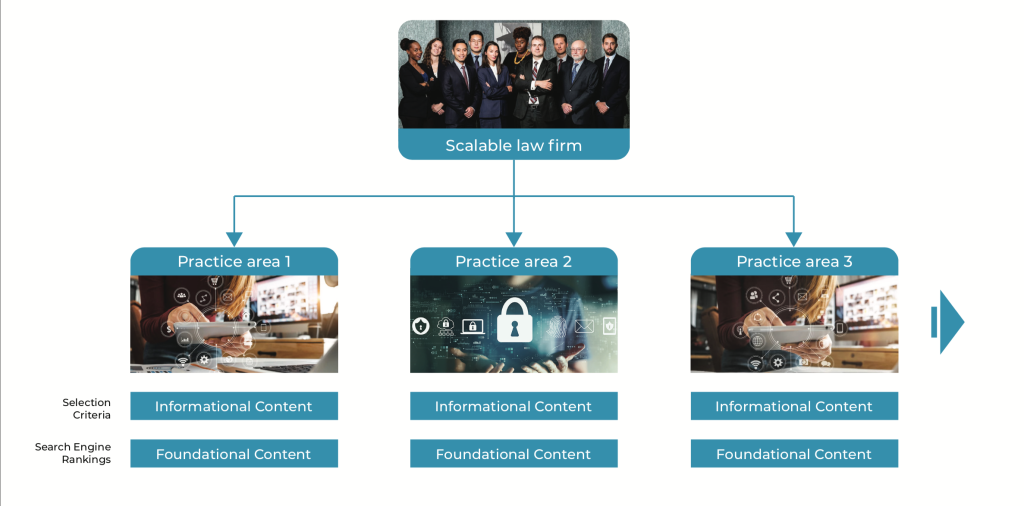How to grow legal practices with digital marketing
The pandemic has accelerated the digitisation of many industries, including the law profession. Many law practices have taken advantage of digital marketing for legal practices to grow their practices.
The size of the legal industry in South Africa
The legal industry in South Africa is growing. According to Statista the revenue of the industry “legal activities“ in South Africa will amount to approximately 4.9 billion U.S. Dollars by 2023.

The size of legal practices
The legal industry in South Africa is growing. According to Statista the revenue of the industry “legal activities“ in South Africa will amount to approximately 4.9 billion U.S. Dollars by 2023.

- 13,00 are sole practitioners
- 2,300 practices employ 2 to 9 practitioners.
- Only 100 practices employ more than 9 legal practitioners.
How to grow a successful legal practice
During the pandemic law firms embraced digital marketing as they were concerned about their lack of face time with clients. Now their clients are all online and they do their own content research to select a legal practice.

Law firm content marketing helps lawyers connect with their target market and generate leads by creating content that provides practical advice and useful insights.
Distributed via a variety of online platforms, content can help you capture new audiences, highlight your successes and, ultimately, grow your caseload.
Why is content marketing important for legal practices?
When somebody needs legal support, they go straight to Google. Not Facebook, not Instagram nor Snapchat. Whoever is on page one is getting that business.
Most law firms have no marketing teams at all.
A sound content marketing strategy enables law practices to rank more highly on the search engine results pages, and capture more search traffic which connects them with more customers. By offering specific and useful content, law firms can really stand out from the crowd in their respective markets.
Case study
In the post pandemic era, being an established reputable legal firm is not good enough anymore to compete online with other law firms online resulting in lost business.
In one such case study a legal firm decided to invest heavily in their online presence with an upgrade to their website and content. As a result, they saw an 10-fold increase in organic with a 6-fold increase in the qualified lead flow and being able to grow from 2 to 7 attorneys in under 2 years.
Podcasts
Busy professionals like legal practitioners often do not have time to create content. Producing podcasts around specific topics or client case studies can make the task a lot easier. These podcasts can then be transcribed into searchable text and uploaded and posted online.
How to grow your legal practice with digital marketing
First, grow additional practice areas

Larger law firms have teams that are organized around industries or large clients.
But it is important to understand what questions are asked for each when searching online. By understanding what these questions are, you can better address their needs with your content marketing.
For example, enter the topic (for example, “personal liability protection”) and select the location. Cape Town, South Africa. There can be several practice areas, from personal injury, pedestrian accidents, wrongful death, and more.
Then create Content Hubs
Build content hubs around these related keywords/ideas. Create articles focused on the practice area—an area of interest for the audience. For example, write about mistakes to avoid after a car accident, accidents avoiding leased cars, hit and run accidents, as well as insurance claims dos and don’ts. By providing a comprehensive resource like this, firms establishe expertise in the area, answers reader questions, and helps improve their search engine optimization (SEO).
SEO and Informational Content
- foundational content is content (SEO) that increases the visibility and organic search rankings of either your practice area pages or your location page.
- informational content helps potential clients select a law firm for their needs.
This means that:
- Each location that your law firm wants to practice in should have its own content hub
- Each of your practice areas should have its own content hubs too
- All your informational content on your website should then support one of these foundational hubs

For example, someone has a specific legal problem they:
- first use organic search (SEO) to identify lawyers in their location and practice area (Foundational).
- then use selection criteria to determine which of those lawyers to choose (Informational)
In other words, being found online SEO is not good enough without informational content justifying why you should be selected.
But professionals such lawyers and medical doctors should be careful what content they publish and make sure it is of the same standard as during a consultation.
Expertise, Authority and Trust
Professions with websites, such as medical and legal practices, that offer services that can impact users’ life are categorized by Google as YMYL:

For such websites, Google’s algorithm is particularly trained to search for qualities that signal Expertise, Authority and Trust (E-A-T) of their content and may even penalise such websites if their content is not up to scratch.
The bottom line is to ensure a coherent content management strategy.
Forward looking legal practices are positioning themselves for growth with digital marketing.
Click here to find out more about Vibe Marketing East Coast, or here to speak to one of the Vibe Marketing team.

